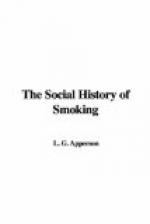Ben Jonson has given us an amusing picture of the behaviour of gallants on the Elizabethan stage, in his “Cynthia’s Revels.” In this scene a child thus mimics the obtrusive beau: “Now, sir, suppose I am one of your genteel auditors, that am come in (having paid my money at the door, with much ado), and here I take my place, and sit downe. I have my three sorts of tobacco in my pocket, my light by me, and thus I begin. ’By this light, I wonder that any man is so mad, to come to see these rascally tits play here—they do act like so many wrens—not the fifth part of a good face amongst them all—and then their musick is abominable—able to stretch a man’s ears worse than ten—pillories, and their ditties—most lamentable things, like the pitiful fellows that make them—poets. By this vapour—an’t were not for tobacco—I think—the very smell of them would poison me, I should not dare to come in at their gates. A man were better visit fifteen jails—or a dozen or two hospitals—than once adventure to come near them.’” And the young rascal, who at each pause marked by a dash had puffed his pipe, no doubt blowing an extra large “cloud” when he swore “by this vapour,” turns to his companions and says: “How is’t? Well?” and they pronounce his mimicry “Excellent!”
Smoking was not confined to the auditors on the stage, who paid sixpence each for a stool. There was the “lords’ room” over the stage, which seems to have corresponded with the modern stage boxes, the price of admission to which appears to have been a shilling, where the pipe was also in full blast. Dekker tells how a gallant at a new play would take a place in the “twelve penny room, next the stage, because the lords and you may seem to be hail fellow, well met”; and Jonson, in “Every Man out of his Humour,” 1600, speaks of one who pretended familiarity with courtiers, that he talked of them as if he had “taken tobacco with them over the stage, in the lords’ room.”
Among the general audience of the theatre smoking seems to have been usual also. The anti-tobacconists among those present, few of whom were men, must have suffered by the practice. In that admirable burlesque comedy by Beaumont and Fletcher, “The Knight of the Burning Pestle,” 1613, the citizen’s wife, addressing herself either to the gallants on the stage, or to her fellow-spectators sitting around her, exclaims: “Fy! This stinking tobacco kills men! Would there were none in England! Now I pray, gentlemen, what good does this stinking tobacco do you? Nothing, I warrant you; make chimneys a’ your faces!” But many women viewed tobacco differently, as we shall see in the chapter on “Smoking by Women.” Moreover, this good woman herself, in the epilogue to the burlesque, invites the gentlemen whom she has before abused for smoking, to come to her house where she will entertain them with “a pottle of wine, and a pipe of tobacco.”




